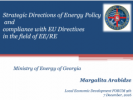AFGHANISTAN: Renewable Energy Policy
The National Renewable Energy Policy (ANREP) aims to mainstream renewable energy in the national energy sector planning so deploying them in different capacities and through different projects in various parts of the Country. It aims to provide a thrust and direction to the renewable energy (REN) sector. The Policy is aligned to the Power Sector Master Plan (PSMP) and the Afghanistan National Development Strategy (ANDS) to set a framework for deployment and growth of REN and it connects with the Rural Renewable Energy Policy (RREP) on the other to ensure seamless adoption and implementation of the policy guidelines in rural energy sector. The Policy sets a target for deploying 350-450 MW of REN capacity by 2032, which is equivalent of 10% of the total energy mix of 3500-4500 MW as per the targets of PSMP. To achieve its targets, the NREP supports the involvement of the private sector, government and non-government organisations, donors and the people of Afghanistan. The Policy will be implemented in two terms- TERM 1 (2015- 2020) will create and support an atmosphere and activities for the development and growth of REN sector particularly in the PPP mode, and TERM 2 (2021-2032) will deploy REN in full commercialization mode.

